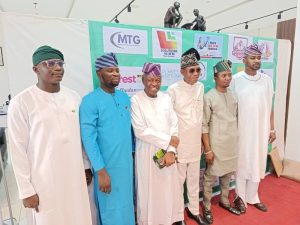…says rule of law, systemic reform vital to development
The Special Adviser to the President on Media and Public Communication, Mr. Sunday Dare, has said that Nigeria’s development and stability depend on genuine restructuring of its governance system and strict adherence to the rule of law, which he described as the foundation of true democracy.


Dare stated this in Ibadan during a public dialogue organised by the Media Transformative Group (MTG), themed “Nigeria at 65: Rule of Law — Systemic Problem, The Way Forward,” held at the IACD American Corner, Jericho, Ibadan.
According to him, Nigeria’s inability to modernize its justice and governance architecture has kept it “trapped between the rule of law and the rule of men,” adding that meaningful restructuring must begin with fixing systemic weaknesses in law enforcement, justice administration, and public accountability.
“Our challenge with the rule of law in this country is systemic rooted in the interlocking weaknesses of our legal framework, justice administration, law enforcement, and public morality,” he said.
“A dynamic society cannot operate under static laws. We must restructure the architecture of justice, not just its furniture.”
The presidential aide lamented that Nigeria still operates under outdated colonial-era laws that do not reflect modern realities, stressing that legal modernization, police reform, and digital justice systems are crucial to rebuilding citizens’ trust in governance.
He added that President Bola Ahmed Tinubu’s administration has already begun addressing these long-standing structural issues through police reform, public finance restructuring, and judicial independence efforts, noting that “reforms are progressive and take time to manifest.”
“When you talk about restructuring, this administration is already pressing the right buttons from police reform to fiscal discipline,” Dare said.
“Even the issue of state police, which past leaders avoided, is now being addressed because only state police can fix our security. These are key elements of restructuring.”
Dare also praised the media for its watchdog role in sustaining democracy, urging journalists to use their platforms to promote accountability and civic education.
“The media is the oxygen of our democracy. It must not only report infractions but also educate and interrogate systemic weaknesses that enable injustice,” he stated.
Other speakers at the event supported the call for restructuring as the foundation for national renewal.
The Chief Press Secretary to the Oyo State Governor, Dr. Sulaimon Olanrewaju, who served as one of the panelists, said the supremacy of law and equality before the law are fundamental to a functional state.
“If everyone is equal before the law, there would be no different rules for different people. That’s the foundation of true democracy,” Olanrewaju said.
The Co-chairman of the event, Deacon Owolabi Oladejo, emphasized that Nigeria’s structural imbalance stems from its forced amalgamation, insisting that true restructuring requires national dialogue and constitutional realignment.
“We must sit down and agree on how we want to govern ourselves,” he said. “Before the military era, regions had their own constitutions and autonomy that’s what real federalism means.”
In his goodwill message, the Sabiganna of Iganna, Oba Saliu Oyemonla Azeez, called for attitudinal change among Nigerians, stressing that “human belief and compliance with the law will make the system work.”
Earlier in his welcome address, the Chairman of MTG, Dr. Babatunde Tiamiyu, said the discussion was timely and necessary to “reimagine a just and functional Nigeria,” while the representative of the National Orientation Agency (NOA), Mrs. Ajolayo Akande, pledged the agency’s support for media-driven civic enlightenment that promotes national unity and value reorientation.
The event featured panel discussions, award presentations, and robust engagement among media practitioners, civil society leaders, and policy advocates.

